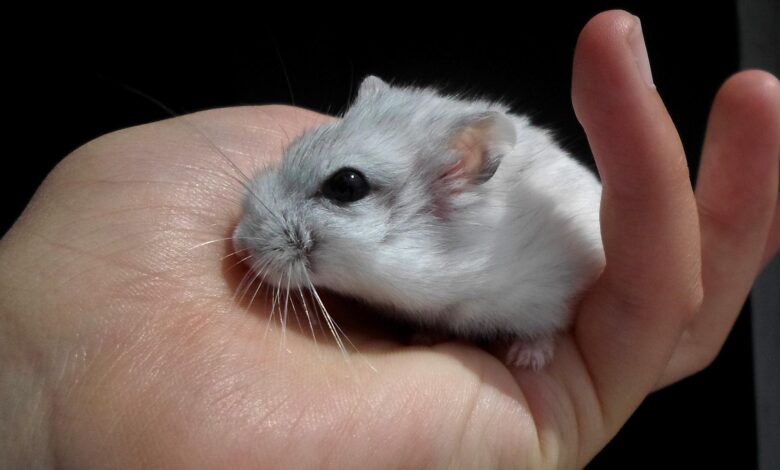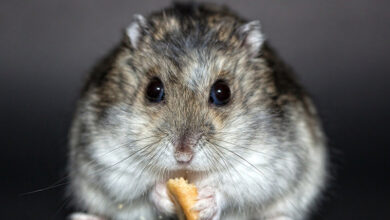18 Things Hamsters Hate in 2023

If you live with a hamster, you know they are over-sensitive creatures but not precisely in the way you think. Sometimes their behavior is just misunderstood, and this article will discuss the 18 things hamsters hate and you should avoid.
1/ Living with guinea pigs or rabbits
hamsters, guinea pigs, and rabbits are similar in size, and all are prey animals, but they should not be kept together in the same enclosure. These animals don’t get along well when placed in the same section because hamsters are solitary animals.
2/ Chasing after them
Although chasing after your hamster may seem like all fun and games from your perspective, it can be devastating for your pet. When chased around, your pet gets frightened, and their heart rate could skyrocket. Not only could this affect their health but also, they may start to dislike you and stay away from you in the fear that you might want to hunt them again. Make sure not to do anything that could cause anxiety in your hamster.
3/ Traveling
hamsters hate traveling because they would rather be at home where they feel safe. Being outside of their known environment makes them feel anxious and vulnerable. Likewise, hamsters hate car rides because a car is an unfamiliar environment filled with strange noises and weird smells. All those noises and abnormal movements are scary for hamsters.
4/ Dressing
some hamster owners confuse caring for their pets with treating them like babies. It’s important to remember that a hamster is a hamster and needs to be treated as such. A typical example is an owner who dresses up their pet for a cute photo or because they may look pretty. Remember that hamsters are animals, and putting clothes on them will agitate and upset them.
5/ Being picked up
hamsters are prey animals and, as such, are uncomfortable with being picked up and don’t have an automatic pulling away or trying to escape. That doesn’t mean they don’t like you. It’s just that they are prey animals, and they don’t know if you will eat them or not, but hamsters can be trained to enjoy being held. The key is making your hamster comfortable around you, and using your hand, your hamster will gradually build trust with you and know that you’re not going to hurt them. Once they are comfortable with you, they will indeed like your touch.
6/ Having nowhere to hide,
Hamsters are prey animals, and Open Spaces without a place to disguise make them feel nervous and vulnerable. Your little pet needs to have a safe place to hide when they feel threatened or are spooked. Hideouts or an essential item for your hamster’s enclosure will help your pet feel safe and confident, and make sure not to disturb or enter their Hideout. Is it your pet’s safe place to rest?.
7/ Visitors and Strangers
As prey animals hamsters are very skittish animals. They are fearful of unfamiliar people, and weird new smells there for strangers or visitors are often perceived as scary, which generates a stressful experience for your little friend.
8/ Socialize with Predators
By Nature dogs and cats are predators, and hamsters are. Pray you may think it’s cute to introduce your little pet to cats or dogs. Still, these are predatory animals and can be very frightening for your Hammy. Make sure that your hamsters have a safe and secure place and that any interaction between your pets is closely supervised.
9/ Small Children Young Children are unpredictable and impulsive
They can sometimes harm or frighten the hamster. Keep in mind that hamsters are sensitive to miss handling. A hamster could be put in danger of being mishandled due to its unique touch and support requirements. Children are also less able to articulate their voices and movements. This experience can be a great stress for a fragile Hemi to ensure every interaction between kids and hamsters is supervised.
10/ Not enough Space to exercise although hamsters are tiny
They need plenty of exercise Borough and explore tunnels hamsters are high-energy animals. Their bodies are built to run in the wild hamsters run up to six miles every night to search for and gather like the fantastic hamster your captive one is still biologically programmed to be energetic. You should be able to tell this by how much they run in their wheel every night, so be sure to provide your hand with an environment as large as possible with the enrichment they need to stay happy such as sand-bath different substrates and appropriately sized wheel keep in mind that hamsters are burrowers. Hence, your little bit needs at least six inches of bedding to dig, burrow, hide and stay occupied. Keeping your hamster in tiny cages is unkind and can cause various stress-related and health problems such as obesity, depression, and boredom.
11/ Sharing their Territory
Because hamsters are so territorial and rather solitary animals it’s. Generally, most hamsters don’t like to share their territory with other hamsters. Adding more than one hamster to the same cage could lead to nasty fighting or even death.
12/ A dirty or Smelly Living space
Hamsters are very clean animals and they appreciate a clean friendly environment dirty and smelly Holmes will create mental and physical health problems for your pet a habitat with an accumulation of dust your in dirt and poop can cause respiratory illnesses in hamsters where they may have trouble breathing it can also result in the growth of harmful bacteria make sure to clean your hamster’s cage regularly but remember just like cleaning your Hammy’s cage not often enough can be detrimental to their house cleaning their enclosure too often can also lead to Stress and Anxiety hamsters use their scent glands and poop to mark their territory in their cage when you remove all the bedding and wipe down everything when you clean their enclosure you are removing all their said so it becomes a brand new environment for them again this can cause them Stress and Anxiety in one recent study found that conducting a full cage clean raise the completely calm down so instead of thoroughly cleaning out their enclosure it is best to spot clean your pets living Space.
13/ Too Much Change Too Often, hamsters hate any change
If it happens too often, they are terrified when brought to a new home. Have you moved into a new house or shifted your hamster’s cage to a new room? They will need time to adjust to the new environment. Some hamsters don’t even like anything to be changed in their current enclosure. Even a slight change can cause significant stress. Make sure to avoid rearranging your hamster’s living space too much.
14/ Cotton Fluff Bedding never uses cotton fluff for nesting
Cotton Club is harmful because it is not digestible. If your hamster accidentally swallows it, it can cause blockage in your pet’s digestive system and lead to the cotton can also getting wrapped in the limbs and cut off circulation leaving the stems dead some hamsters may even chew off their limbs to free themselves you save easily digestible materials such as paper-based bedding or toilet paper so they can easily go through a hamster’s digestive system these materials also don’t have enough tensile strength to cut off circulation to your hamster’s limbs.
15/ Strong Smells hamsters have a very keen sense of smell
This is why hamsters hate the overpowering smell of such as perfumes, deodorant, strongly scented soaps, lotion, and garlic, and some air fresheners. Essential oils are another thing hamsters dislike. Don’t keep them around your hammock, especially if not diluted. Hamsters also despise the smell of citrus and olive oil; likewise, make sure not to use pungent cleaning products in their living Space never.
16/ Waking Them up
Hamsters are nocturnal / crepuscular. This means they naturally sleep during the day and are more active at dawn and dusk some hamsters May wake up for a quick snack or drink during the daytime, but in general, they sleep during the day, things you should not wake up your hamster to play with them instead plan your interactions for late afternoon or early evening after they’ve had their proper rest.
17/ Bathing Them
Hamsters are known to be very clean animals who groom themselves often. Therefore, they don’t need a bath these animals don’t have sensitive skin, and fast may result in dry fur coats and skin problems finding them can send a hamster into shock hamsters are also sensitive to temperature changes which is another reason why bathing them is it recommended dampfer can heat Their little bodies too cold is your little hamster has dirt in a certain area of its body you can spot clean them using a damp washcloth sand bathing it’s also something most hamsters love it’s what they would do with the wild provide your pet with a container of pet safes and your hamster will dig and roll around in the sand granule Elvis and his abrasive it removes grease moisture and dirt from their fur.
18/ Loud Noises are stressful
For your hamsters because they have much more sensitive hearing than humans. Keep in mind that hamsters are prey animals, and their sense of fear is a survival tactic; therefore, it’s easy for hamsters to get frightened by the sound of slamming doors, vacuum cleaners, horror movies, loud Vehicles, blenders, or hair dryers can be terrifying for your little pet that’s why it is essential to place your hamster’s enclosure in a quiet room where there aren’t many people in young children constantly walking around.
